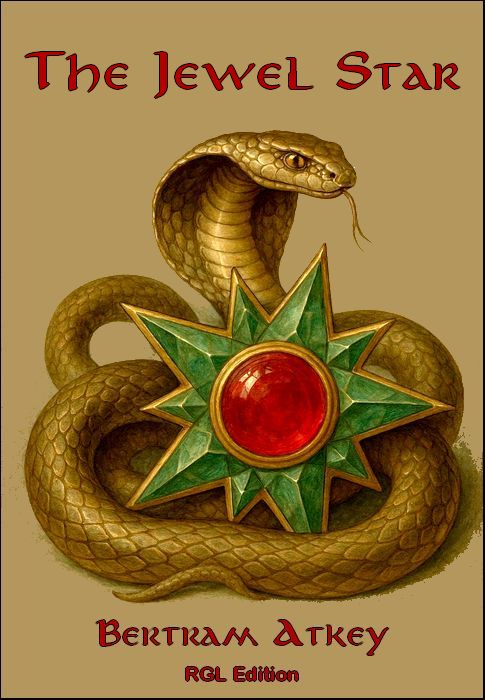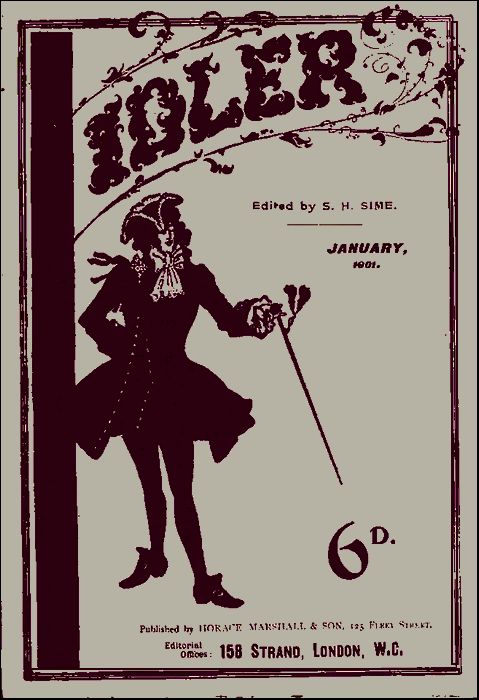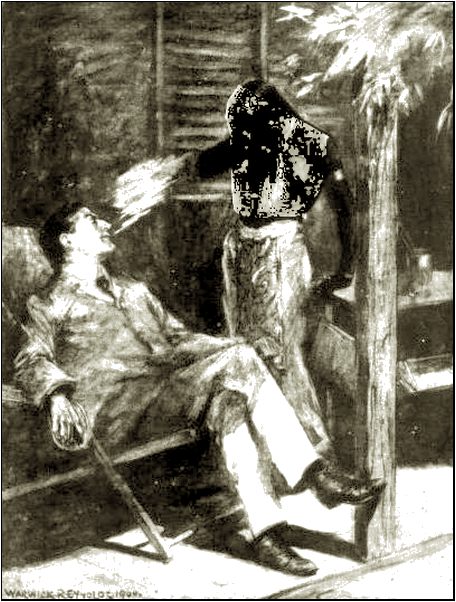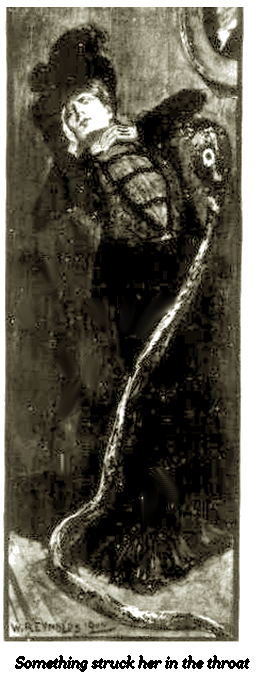
RGL e-Book Cover©
Roy Glashan's Library
Non sibi sed omnibus
Go to Home Page
This work is out of copyright in countries with a copyright
period of 70 years or less, after the year of the author's death.
If it is under copyright in your country of residence,
do not download or redistribute this file.
Original content added by RGL (e.g., introductions, notes,
RGL covers) is proprietary and protected by copyright.

RGL e-Book Cover©


Idler, January 1901, with "The Jewel Star"
REGGIE LEESMITH lay back in his low cane chair, selected a cheroot, and lit it carefully. Then he began the letter again. It was Her letter the last he would receive before he went home.
"Will you be very glad to come back to me?"—there he stopped to laugh gladly—"Would he?" Reggie stared from under the verandah across the sun-baked, dust-driven compound, smiling. The dull measured throb of a tom-tom, beaten by a musically inclined coolie, came up to the dak-bungalow, and his smile broadened. Would he be glad to leave that sort of thing? He looked up under his eyebrows at the sullen copper sky, and thanked his household gods that he would be out of it all before cholera gripped the district. For he was sick—sick to death—of India, her sights, her smells, her sounds, her worries, and—above all things—her loves.
"And," he murmured—"and yet I was wild to come out here, once upon a time. But I have learned things since."
He resumed the letter, reading slowly because it would have to last him a long time, and it is not a fit thing that a man should skip letters from his wife about to be.
Presently he looked up, instinctively aware that someone was watching him. He started a little and put the letter in his pocket. A girl—a native girl—had approached him quietly, and stood now by his side, waiting until he should see her. She was very beautiful, and, for a native, very fair.
Leesmith's face darkened.
"Well?" he queried, wearily, in the vernacular.
The girl was silent, but her lips trembled ever so little, and her breath quickened.
"Well?" repeated the man, "why are you here again?"
She remained silent. Only her body drooped and she seemed very tired.
"My dear girl, what is it you want now?" he said a little more gently.
Her eyes brightened at the tone, and she threw out her arms. "Oh, Reggie, Reggie!" she cried, and covered her face with her hands, weeping.
She pronounced the name funnily, with a delicious accent, and he cursed the hour he had taught her the way to pronounce it. Yet once on a time, not so long past, it had seemed the sweetest music to him. But he had been home since then, and now it sounded so old and worn that he was tired of hearing it. Besides, there was someone at home who could pronounce a fellow's name properly.
"Now look here, Lalu, my good girl, this sort of thing must stop. I can't have you coming here at all hours of the day making a scene, you know. If it is more money you want say so, and I will put it right. Now stop crying, there's a good girl, and try to look at the matter sensibly."

"Now stop crying, there's a good girl."
The girl only rocked to and fro, sobbing.
Leesmith looked on unsympathelically, for he had seen it all before, and it was growing monotonous. Thank Heaven, he would be away from it all in a day or two. He yawned audibly, and Lalu ceased crying, looking up with burning eyes.
"And what of our little son?" she asked furiously. "Will you desert him also—fling him aside as you have me?"
He stirred uneasily in his chair.
"My dear girl, I thought we had arranged all that before. Why are you always bringing it up again? It is of no use to be continually talking about it. If you have not enough money, tell me."
"I have enough money," she replied dully, "and your vows—what of the vows you made me in the past?"
He swore. "Oh, go—go. before I hate you!" he snarled.
Lalu started, "Hate?" she cried, wringing her hands.
"Yes, hate—no, no, Kalu, not hate. I couldn't hate you"—he was lying, and the girl half guessed it—"but cannot you see, dear. I must go? I have inherited lands and money, and I am ordered to go. There is no help for me."
"Then why not take us—our little son and me?" she said simply.
"Oh, you do not—cannot —will not understand. It is impossible. I will not talk of it again."
There was a strained silence, but he broke it in a few moments.
"I may come back." he said hurriedly. "Good-bye."
"My lord will never come back," she answered.
"Good bye, Lalu."
The girl drew nearer,and her eyes shone. "Good-bye, Reggie. Kiss me," and bent over the chair with a half-strangled sob. His moustache brushed her lips and she whispered," Will my lord accept a little offering? only a small gift but perchance it will remind him when he looks at it, by and-by, of his little son and of Lalu, the daughter of the Snake Charmer."
She handed something that glittered with a pale green light dashed with red: "It is only a little—a poor gift and—and—kiss me once more, my love."
He kissed her and she went away very slowly. looking back over her shoulder with an unholy blaze of hate and instinctive jealousy lighting her eyes.
Reggie Leesmith looked after her with a strange expression on his face. Then his eyes dropped to her present. He felt a little ashamed and half rose to call the girl back. After all he had loved her very dearly once—but as he moved Her letter crackled and he sneered instead, his eyes on the gem.
It was a curious gem. Star-shaped, with sharp points, it threw a pale green lustre—green of a tint he had never seen before,and in the centre was a crimson spot the size of a threepenny' piece, that quivered unceasingly. He moved his hand under the sun to catch the lights, and the jewel burned and glittered wickedly.
"Just the thing for Irene. By Jove, I'll give it her as a wedding gift. She shall wear it at her bridal. I'll have a guard put on those points, though."
He put the jewel into his pocket and took out the letter again, never seeing an angry, furious face that peered from behind a clump of aloes, a little way down the compound—the face of Lalu, daughter of Jut the Snake Charmer.
Presently he went indoors and locked the jewel away.
Later he left India for ever.
IT was the marriage eve, and Reggie Leesmith sat alone for a space in the dining-room of his newly acquired house.
The lights had not yet been turned on and it was growing dusk. Only the fire-flames gave out their shifting flickering glare, growing stronger as the darkness came down. The heavy black shadows crept over the ceiling, and the man sat silent with his chin sunk on his breast
He was thinking of Lalu and his little son. Leesmith had been glad to come away. There was no safety in India with that wild cat loose, and he was surprised that she had taken his desertion so quietly. For he had upon occasions caught a glimpse of the temper of the girl before—not the lightning-like fury of an Englishwoman, but the slow, implacable, remorseless wrath of the Oriental. Once, he recollected, when a drunken coolie had kicked their little one, he had seen that sullen, nursed wrath, and in the course of time the misguided coolie had been found dead. It had been nothing of course, less than nothing, only a coolie gone; but as she had told him the man was dead, he noticed the tone of her voice, and shuddered.
But she had let him go, and he intended never seeing her again. She and the boy he had made rich according to native standards, and now they must take their chance. After all, he argued, he had behaved a great deal better to them than some fellows would have done. And his easily-soothed conscience was quieted.
He took out the jewel she had given him, and,holding it at an arm's length, admired it for the hundredth time.
Just the sort of gem to set off the Saxon beauty of his bride to be, and yet there was something about it he did not like.
Leesmith was not by any means an emotional or imaginative man, but as he gazed at the quivering light that flung back the red glare of the fire, a strange sensation, akin to fear, crept over him, and he thought that perhaps he would not care to give it to anyone he loved.
He shivered a little, clasping his hand over the star nervously, and one of the sharp points ran into his flesh, just penetrating the skin.
He felt a gnawing, chill cold paralyse his arm and run all over his body as he dropped the gem.
"Ugh!" he shuddered and writhed in his chair, trying to rise, but in vain, and the pricked hand fell limply on his knee and contracted.
"Hang it all, what's this?" he muttered, and struggled helplessly to get up; his head shot forward as he fought for his voice,; the icy cold drove in chill waves up to his brain and down to his feet; and his hands narrowed and grew smaller.
A tinkle came sharply to his ears. It was the sound of his signet ring that slipped from his shrinking finger and fell against the fender.
He lifted his feet and they came away out of his shoes and socks, narrowed to points—like the tail of a cobra, for instance and the extremities curling and twisting, as the halves of an earthworm, divided by a spade, curl and twist.
Again he tried to scream but there only came a thin dry cackle, and his tongue shot in and out of his mouth rapidly.
God! what was this? Was he dreaming? Was he going mad? He tried to pinch himself, but there were no fingers—only those horrible writhing points.
Leesmith felt his body shrinking now. His hands and feet were gone, but he found no physical pain in the change. Only a numb cold, and a horrid fear, whilst as he stared his legs grew into one another and lengthened pointedly.
He threw back his head, ami the hair from his eyebrows fell over into his starting eyes, and there was no sting, because a film had grown over the eyeballs.
Again he essayed to cry out, and the sound that came was a hiss—like the hiss of a disturbed cobra.
And then he felt his mind going, and the fear fell off him as a cloak falls from a woman's shoulders.
He slid from the heap of clothes on the chair, and lifted his head to a level with the mirror on the mantel, and the fleeting soul of the man stared, in the semi-dark, through cobra's eyes, at the venomous, evil, hooded head of a cobra.

Then the last flicker of light died out from the fire, and all that remained of Reggie Leesmith lay coiled on the hearth-rug. basking in the warm glow of the live coals, its head resting on the jewel star.
A footman knocked softly at the door, received no answer but an unheard hiss, and entered. The man switched on the electric light, and left the room, noticing nothing.
Overhead someone began playing a violin, and the cobra raised its head, swaying gently from side to side until the music ceased, and a sound of laughter came instead. Some people were happy, it seemed.
But the snake on the rug hissed, and a black forked tongue played about its mouth. More and louder laughter, and the snake glided round the room, nosing the corners anxiously, seeking a means of escape.
There came a sound of wheels grinding on the gravel outside, and the door of the room opened, admitting a pretty girl, who blinked in the white light
"We are going now, Reg why, he's not here!"
She stepped forward to the table, and her foot struck something—something that hissed, and, rearing an evil, swollen head to her face, struck her in the throat twice.
The girl gave a helpless cry, and fell forward on her face, whilst on the threshold a little dog whined pitifully.
Outside the horses fretted and stamped, jangling their bits impatiently; in the room a cobra whipped and lashed beside a living girl: on the hearth-rug glowed the jewel star; and thousands of miles off, in far-away India, the giver of the jewel crooned softly to a pale yellow baby.
Roy Glashan's Library
Non sibi sed omnibus
Go to Home Page
This work is out of copyright in countries with a copyright
period of 70 years or less, after the year of the author's death.
If it is under copyright in your country of residence,
do not download or redistribute this file.
Original content added by RGL (e.g., introductions, notes,
RGL covers) is proprietary and protected by copyright.